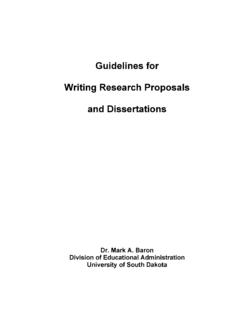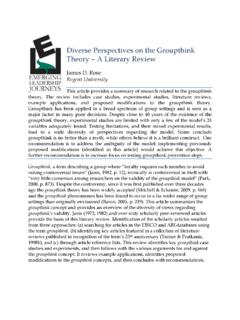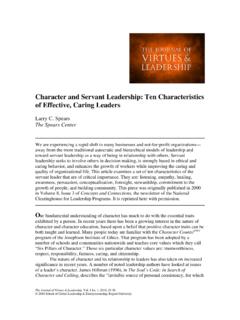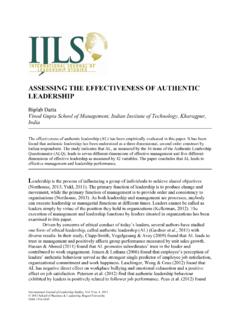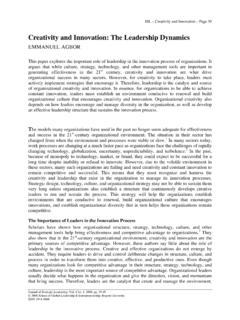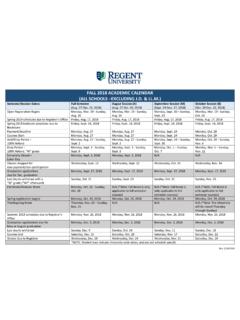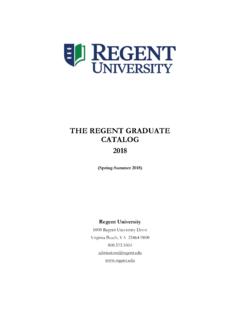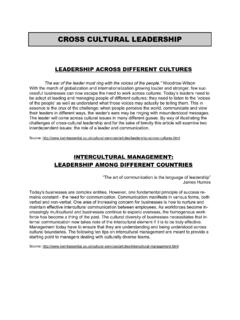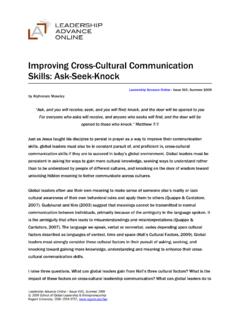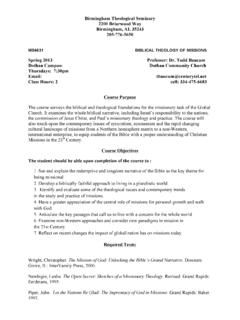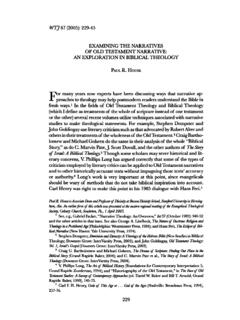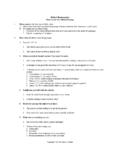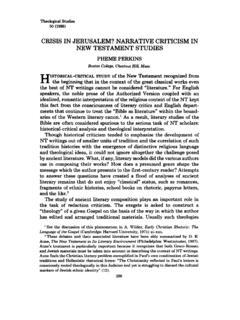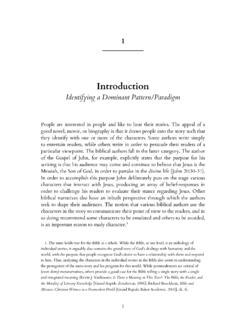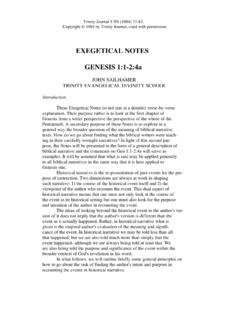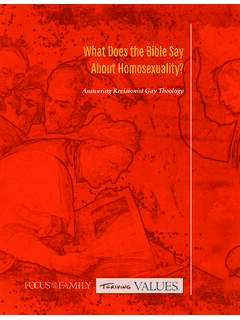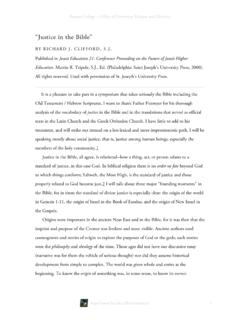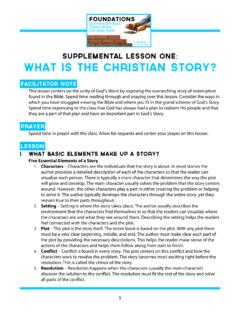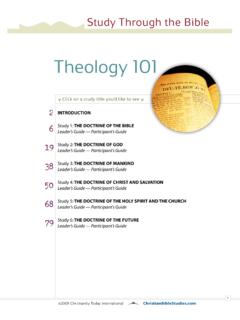Transcription of A NARRATIVE ANALYSIS OF THE JERUSALEM …
1 Journal of biblical Perspectives in Leadership 5, no. 1 (2013), 39-62. 2013 School of Business & Leadership, Regent University ISSN 1941-4692 A NARRATIVE ANALYSIS OF THE JERUSALEM COUNCIL DISCOURSES: TABLE FELLOWSHIP AND THE IMPLICIT THEOLOGY OF SALVATION MICHAEL MAHAN This study undertakes a NARRATIVE reading of the text of Acts 15:1-31 and develops the construct of implicit theology, defining it as generic, usually unspoken ideas about the theological realm that have a measurable effect on individual and congregational behavior. The reading of the JERUSALEM council NARRATIVE (Acts 15:1-31) highlights three points of view regarding law, grace, and fellowship considerations.
2 This study finds that one chief thread of the NARRATIVE is the issues of the practical matter of fellowship between Gentiles and law-following Jewish Christians. The practical issues in the NARRATIVE reveal the main NARRATIVE thread of the contrast of differing perspectives on the theology of salvation. Based on the council NARRATIVE , it is suggested that in applied settings, the implicit theology of salvation is a balance between grace and law rather than a dichotomous, theological position. This study proposes the development of instruments measuring implicit theology in congregational studies, potentially revealing implicit theological tenets underlying observable congregational characteristics.
3 The JERUSALEM consultation, recounted in Acts 15:1-31, describes a significant practical issue regarding the integration of Gentile Christians into what had been a Mahan/JOURNAL OF biblical PERSPECTIVES IN LEADERSHIP 40 Journal of biblical Perspectives in Leadership 5, no. 1 (2013), 39-62. 2013 School of Business & Leadership, Regent University ISSN 1941-4692 primarily Jewish body of believers. The issues seemed to have been multiple1 and necessitated the assembly of a significant portion of the early church s leadership structure. Through the description of the contextual situation and its resolution, the NARRATIVE presents the possibility of an implied theological issue underlying practical issues such as the potential fellowship of believers with radically divergent life practices.
4 I. ACTS 15: AN OVERVIEW The JERUSALEM council NARRATIVE is pivotal to the body and theology of Acts2 and has been at the center of much scholarly discussion as According to Bock, numerous practical concerns are at stake: 1. How can Gentiles ignore God s covenant law? 2. How can fellowship occur if Jewish Christians keep the law but Gentiles do not? 3. Does the issue of uncleanness emerge? 4. How can law-observing Jewish Christians and law-ignoring Gentile Christians coexist? 4 In the council NARRATIVE , amidst a certainly heated discussion of the practical issues of circumcision, strangled animals, blood, fornication, and the general issue of the Law of Moses, the apostle Peter addressed a theoretical issue.
5 As a conclusion to his monologue, the apostle stated, But we believe that we are saved through the grace of the Lord Jesus, in the same way as they also are (Acts 15:11).5 In Peter s estimation, then, the issues of law following were the manifestations of the implied theological of salvation. II. NARRATIVE CRITICISM Hermeneutics and exegesis traditionally offer numerous methodologies for biblical research, yet since the twentieth century, the historical critical method has been In the burgeoning fields of organizational and ecclesial leadership, Vernon Robbins s socio-rhetorical criticism7 has likewise enjoyed an almost exclusive rule as the interpretative methodology.
6 In the case of Acts 15, the vast majority of studies produced to date (with the notable exceptions of Cheung s NARRATIVE ANALYSIS of Acts 1 Darrell L. Bock, Acts: Baker Exegetical Commentary on the New Testament (Grand Rapids, MI: Baker, 2007). 2 Joseph A. Fitzmyer, The Acts of the Apostles: A New Translation with Introduction and Commentary (New York: Doubleday, 1998), 538. 3 Bock, Acts. 4 Ibid., 486-487. 5 All scripture references are from the New American Standard Bible unless otherwise noted. 6 Gerald Bray, biblical Interpretation: Past and Present (Downers Grove, IL: IVP, 1996). 7 Vernon Robbins, The Tapestry of Early Christian Discourse: Rhetoric, Society and Ideology (New York: Routledge, 1996).)
7 Mahan/JOURNAL OF biblical PERSPECTIVES IN LEADERSHIP 41 Journal of biblical Perspectives in Leadership 5, no. 1 (2013), 39-62. 2013 School of Business & Leadership, Regent University ISSN 1941-4692 14:27-15:35, Ben Witherington s The Acts of the Apostles: A Socio-Rhetorical Commentary, and Robert Tannehill s The NARRATIVE Unity of Luke-Acts8) have relied almost exclusively upon the historical-critical method. Precisely the focus on the historical critical approach has led Meier to affirm that only with fear and trembling any exegete should presume to speak of the JERUSALEM council, since reconstructing the events surrounding that meeting is fraught with difficulty.
8 9 Yet John Meier s concern is methodologically bound; approaches such as that of NARRATIVE ANALYSIS need not reconstruct the entirety of the event, nor reconcile it with foreign texts ( , Gal 2) in order to speak of the JERUSALEM council or its theological significance. Meier s bias and subsequent concern have failed to recognize the simple genre of the account. According to Grant Osborne: biblical narratives contain both history and theology.. The historical basis for the stories is crucial, but the representation of that story in the text is the actual object of interpretation.. Our task is to decipher the meaning of the historical theological text in the biblical NARRATIVE , not to reconstruct the original Although NARRATIVE criticism can forego the difficulties of the historical critical method, NARRATIVE criticism can be complemented by other methodologies; specifically socio-rhetorical techniques such as oral scribal intertexture and inner textual repetitive progressive textures are particularly important in a nuanced text such as Acts 15.
9 III. THE JERUSALEM COUNCIL External and Internal Plot The JERUSALEM council NARRATIVE occupies a central role in the book of Acts. This is first clear from a structural perspective. As noted by Joseph Fitzmyer, in his translation, chapters 1-14 have 12,385 words and chapters 15-28, 12,502 words. 11 Acts 15 is also theologically pivotal to the entire book s narrative12 so much so that Haenchen described it as the turning-point, watershed, and centerpiece of The council NARRATIVE concludes the introduction of the gospel to the Gentiles (beginning in Acts 10) and thus marks a change in emphasis from Jewish Christianity to the gospel s work amongst the Gentiles.
10 According to Conzelman, in Acts 15, the concern 8 Alex Cheung, A NARRATIVE ANALYSIS of Acts 14:27-15:35: Literary Shaping in Luke s Account of the JERUSALEM Council, Westminster Theological Journal 55 (1993): 153; Ben Witherington, The Acts of the Apostles: A Socio-Rhetorical Commentary (Grand Rapids, MI: Eerdmans, 1998), 439; R. C. Tannehill, The NARRATIVE Unity of Luke-Acts, Vol. 2, The Acts of the Apostles, A Literary Commentary (Minneapolis, MN: Augsburg Fortress, 1990). 9 John Meier, The JERUSALEM Council. Gal 2:1-10; Acts 15:1-29, Mid-Stream 35 (1996): 466. 10 Grant Osborne, The Hermeneutical Spiral: A Comprehensive Introduction to biblical Interpretation (Downers Grove, IL: IVP, 2006), 200.
